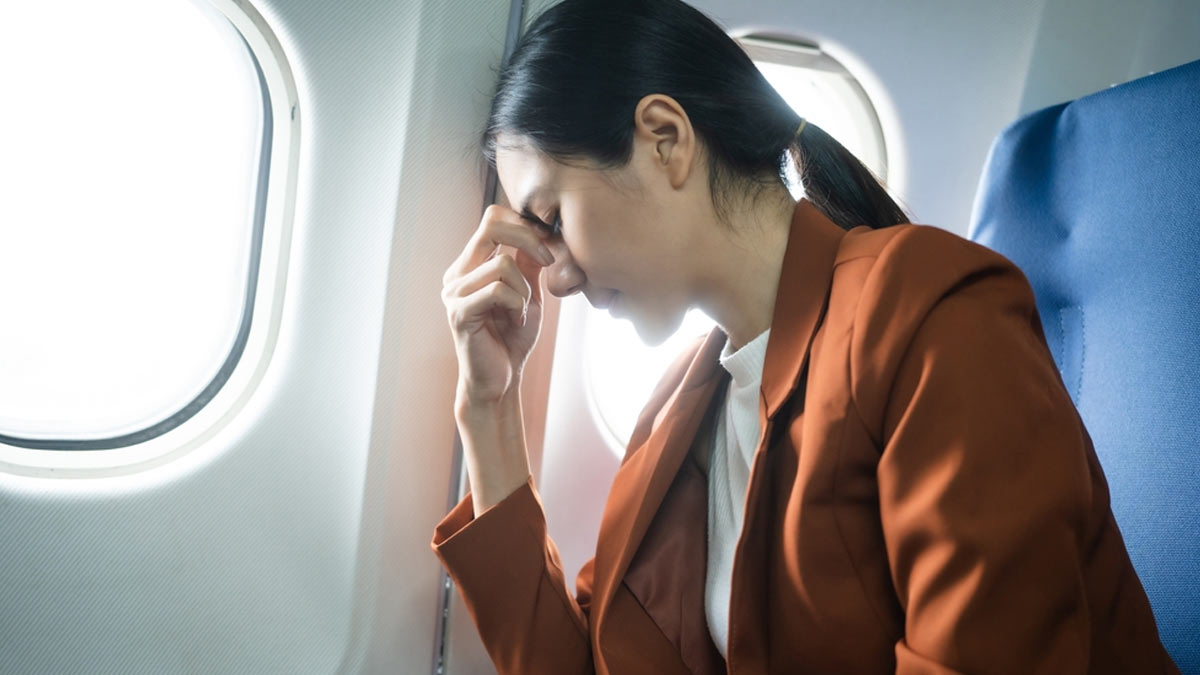
Flying is already challenging for most people, but it becomes even more uncomfortable when you're dealing with congestion. This adds a whole new layer of discomfort and potential complications. Whether your congestion is due to a cold, allergies, or sinusitis, it can turn a flight into an ordeal. In this article, we list some practical tips to help you manage your symptoms and make your journey more bearable.
Table of Content:-

When you're congested, your nasal passages and sinuses are blocked, making it hard for air to flow through. This can cause pain and pressure, especially during a flight when the cabin pressure changes quickly. Since the ears, nose, and throat are connected, these pressure changes during takeoff and landing can worsen the discomfort, potentially causing ear pain or even temporary hearing loss.
Tips To Follow When Flying While Congested
Stay Hydrated

According to a 2024 study, staying hydrated can help thin mucus and enable your body to expel it more effectively. The air in the cabin is dry, and staying hydrated will help keep your mucous membranes moist and more comfortable. Hence, continue to drink water throughout the flight. Also, avoid alcohol and caffeine, as they can dehydrate you and worsen congestion.
Chew Gum or Swallow Frequently
Another way to manage congestion is by chewing gum, sucking on candy, or swallowing frequently. This can help equalise ear pressure during takeoff and landing and reduce the risk of ear pain and pressure.
Also Read: Respiratory Health: Here Are Ways to Clear Chest Congestion And Mucus
Pack Essential Medications

Before you board, you should ensure that you have all your necessary medications packed in your carry-on. This includes prescribed drugs, decongestants, nasal sprays, pain relievers, and allergy medications. Keeping these essentials with you will help you manage your symptoms and remain comfortable during your flight.
Use a Nasal Decongestant
You should consider using an over-the-counter nasal decongestant spray or oral decongestant. These can help open up your nasal passages and reduce pressure build-up. However, be cautious with nasal sprays as their overuse can lead to rebound congestion.
Avoid Sleeping During Takeoff and Landing

You should try to stay awake during takeoff and landing when pressure changes are most significant. Being awake allows you to manage ear pressure better through swallowing, yawning, or chewing.
Also Read: Do Your Ears Feel Blocked On Flights Or Elevators? Expert Explains Reasons Behind It
Practice the Valsalva Maneuver
If you feel the pressure building in your ears, you can even try the Valsalva manoeuvre, which involves exhaling against closed airways. All you need to do is close your mouth, pinch your nose shut, and gently blow as if trying to blow your nose. This can help equalise the pressure in your ears. However, it's important to note that this manoeuvre may worsen certain eye, heart, and ear conditions. To avoid potential adverse effects, it's recommended to consult with a healthcare professional before attempting it.
Use a Hot Compress
If you experience significant discomfort in your sinuses or ears, a hot compress can provide relief. You can ask the flight attendant for a cup of hot water, soak a napkin, and then hold it to your face. The warmth can help ease sinus pressure.
After Your Flight
Rest and Recover

Once you’ve landed, do not forget to prioritise rest and recovery. Congestion can be draining, and your body needs time to heal. Get plenty of sleep, stay hydrated, and continue to take any prescribed or recommended medications.
Use a Humidifier
If you're staying in a dry environment, use a humidifier to add moisture to the air. This can help keep your nasal passages from drying out and becoming more irritated.
Seek Medical Attention if Needed
If you experience severe pain, prolonged discomfort, or hearing loss after your flight, seek medical attention promptly. These symptoms could indicate an ear infection or other complications that need treatment.
[Disclaimer: This article contains information for informational purposes only, hence, we advise you to consult your own professional if you are dealing with any health issues to avoid complications.]
Also watch this video
How we keep this article up to date:
We work with experts and keep a close eye on the latest in health and wellness. Whenever there is a new research or helpful information, we update our articles with accurate and useful advice.
Current Version